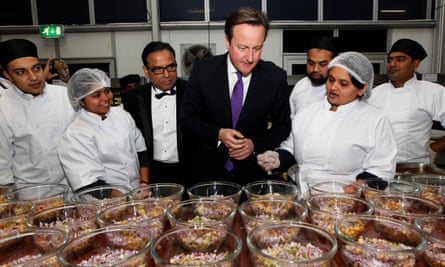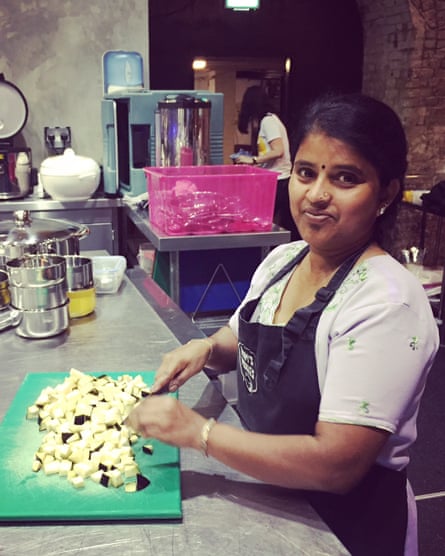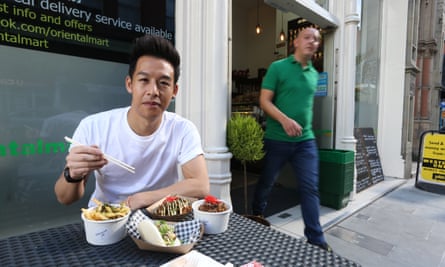The subject has become a key issue in the Brexit debate: who gets in and who has to stay out. And what will Britain look like if we put up insurmountable barriers to people from other countries and cultures who want to live and work here?
The Conservative government has already been tightening up immigration controls for the very people British industries say are most needed – unskilled workers – and is considering a points-based system that would allow only the best-qualified professionals in.
Coupled with plans to make it far tougher for foreign students to study here, the political measures being taken in Westminster are likely to have far-reaching effects on British culture.
But whether in universities, farming, the NHS, in the care or the catering industries, there is a growing sense of unease over who exactly will plug the gaps – especially in filling the low-paid jobs that many British-born workers won’t touch.
Migrants are disproportionately employed in low-skilled work – half of all those working in canning or bottling factories, for example, are foreign born – and since people come here looking for work, most will gravitate to where there are vacancies, leading to a report commissioned by the government advising: “The implication is that in terms of low-skilled employment at least, there are large parts of England and Wales where competition between UK-born and migrant workers will be very small or virtually non-existent.”
Few industries illustrate the positive impact of immigrants on our society as clearly as food. The wealth of tastes and flavours available in our kitchens and supermarkets, the huge variety of takeaways and restaurants on our high streets, is something many British people take for granted.
While the impact of foreign-born workers on the wages and employment opportunities of British-born workers is hotly debated, there are already reports of dozens of curry houses closing down due to a shortage of staff, something that was acknowledged by Theresa May when she was home secretary.
The Observer spoke to five people working in the British food industry, each of whom has contributed something unique to their adopted country.
Enam Ali came from Bangladesh as a teenager in 1974 and went to work in a Southampton burger bar while supporting himself through his studies, quickly abandoning the law degree his parents wanted him to take for a degree in hospitality. He has worked for restaurants and run his own, opened a trade magazine for the sector and advised the government on regulation in the industry. But it was establishing the British Curry Awards in 2005 that makes Ali most proud, and that won him his MBE in 2009.

“I do feel very proud of contributing,” he said. “What has happened here in Britain is such a great story, an untold story, in how all these foods, from India, Bangladesh, Pakistan, were distilled into something else here, the British curry. And it is British – after all there is nowhere else in the world you will find onion bhaji-flavoured crisps. We are exporting mango chutney to India!”
He is worried about the impact of the immigration controls on the curry house. “Already we have a skill shortage, nobody wants to work in the kitchens, not just the Indian restaurant but the top hotels too where half the staff is European or Indian. People want to come and make some money working hard and then go, and we need that contribution. This is a great country but if people are not allowed to come, we will lose a lot from their contribution. And we will lose our curry houses.”
Marianna Leivaditaki was raised in her family’s fish restaurant. “My dad caught the fish, my mum cooked it. I was there every night.” She came to the UK when she was 18 to study and her first job to make ends meet was working behind a vegetable and cheese market stall in Canterbury.
After falling in love with the London restaurant Moro, she got a job there as a waitress. “I was completely shocked to see what people were eating – baked beans and pasta. I had never seen that before. At Moro, it was wonderful, I fought my way into the kitchen! I just worked really hard until they saw I was serious. It was terrifying, though. In Crete we didn’t have chopping boards; we did everything with the hands, and this was a completely different world.”
She became head chef of Moro and is now head chef of owners Sam and Samantha Clark’s latest opening, Morito, in Hackney Road. “I have a lot of dishes from Greece or Crete – they all have stories and it seems everyone loves the stories. I think it’s really sad what’s happening at the moment. When I came here 16 years ago, I wasn’t thinking, ‘I’m migrating’. I was just going somewhere else, for a change. It was a happy exchange of people and I always thought England was a place where you could go, and if you worked hard you’d do well and people would appreciate that. I feel I have contributed.”

Ruby Kughanathan grew up in Sri Lanka, got married and then, fleeing the civil war that left some 100,000 people dead, came to the UK in 2004 with her husband and two young children. At first it was difficult to find work as she spoke very little English and had no qualifications or skills. But determined to do something in her host country, Kughanathan discovered a social enterprise called Papi’s Pickles.
Run by a south Indian mother and daughter team, Shanthini and Abi Ramanan, it is a team of cooks who produce south Indian and Sri pickles for events, and for London’s growing pop-ups and street food market scenes, while working with unemployed women from these communities.
“I wanted to work with Papi’s Pickles, as we speak the same language [Tamil]; it was a huge relief. I was able to get started. This was my very first job.” Kughanathan says she has been transformed from a shy, reserved person to someone who is so confident that she recently addressed a special dinner, talking about the project, and has developed her skills in the kitchen to become one of their most valued chefs, part of a team giving back to the community, completing training and vastly improving her English.
The best bit, she says, is that her children are proud of what their mother has achieved – and now she is part of something that helps other women too.
Edinburgh’s latest restaurant will employ about 100 people when it opens next month, becoming the fifth Dishoom in the UK.
Dishoom was founded by Shamil and Kavi Thakrar and Amar and Adarsh Radia. The first restaurant opened in Covent Garden in 2010.
Its executive chef, Naved Nasir, learned to cook as a child in India. “It was a dream to come to London,” he said. “It was a struggle at first but deep in my heart I had confidence that it would work. The great thing about being here is that you have access to the best-quality ingredients from all over the world. That’s the amazing thing about being in Britain: you don’t have to compromise. But I think the industry is struggling in terms of getting the right people already; the pool of staff with the right background in experience of cooking great Indian food is dwindling. And you need that experience or you lose quality.
“I’m really happy at not only how Dishoom has taken off but also inspired lots of other places. We’re never shy about giving the industry ideas, and it’s changing the perception of Indian food. We have around 450 employees at the moment, and it’s important for me that there is a good career ladder here, so at the moment we have someone who started as a kitchen porter training for a junior manager role.”
When Yan Liu’s father came from Hong Kong in the early 1980s, he started a small supermarket in Hockley, Nottingham, to serve the small, Chinese community and the restaurants and takeaways that were springing up.
Now that he has retired, Yan Liu and his mother run the Orient Mart, a large store and online supplier that imports hundreds of ingredients from all over Asia and employs 10 people. Liu is a keen cook and hopes to open his own restaurant next year.
“My dad said that at the beginning it was pure graft, and it still is hard work. It’s not just me in an office but I have to be pretty hands on, moving boxes and all that as I want to let the staff know that I work as well and as hard as they do.

“There has been a real change in the sort of customer we have, less about the local community from Hong Kong, and it’s great to have people in Britain so interested in different cuisines and you get people coming in asking for ingredients that I’m really surprised they’ve even heard of,” says Liu.
“We get a lot of foreign students here now, from everywhere – Korean, Thai, Chinese, Japanese, Malaysian – who want a bit of home cooking and with Brexit and the pound dropping, they still have the money to spend because they are doing well from the exchange rate, their currency is strong against the pound. But we’ve had to put our prices up as import costs shoot up – they’re sky high at the moment – and local people are feeling that. So yes, that’s a real worry, especially if the numbers of foreign students drop.”
- This article was amended on 24 October 2016 to add the names of the founders of Dishoom.
